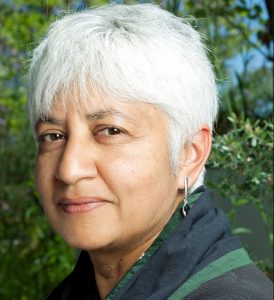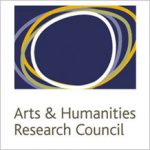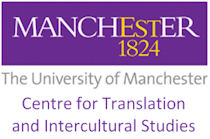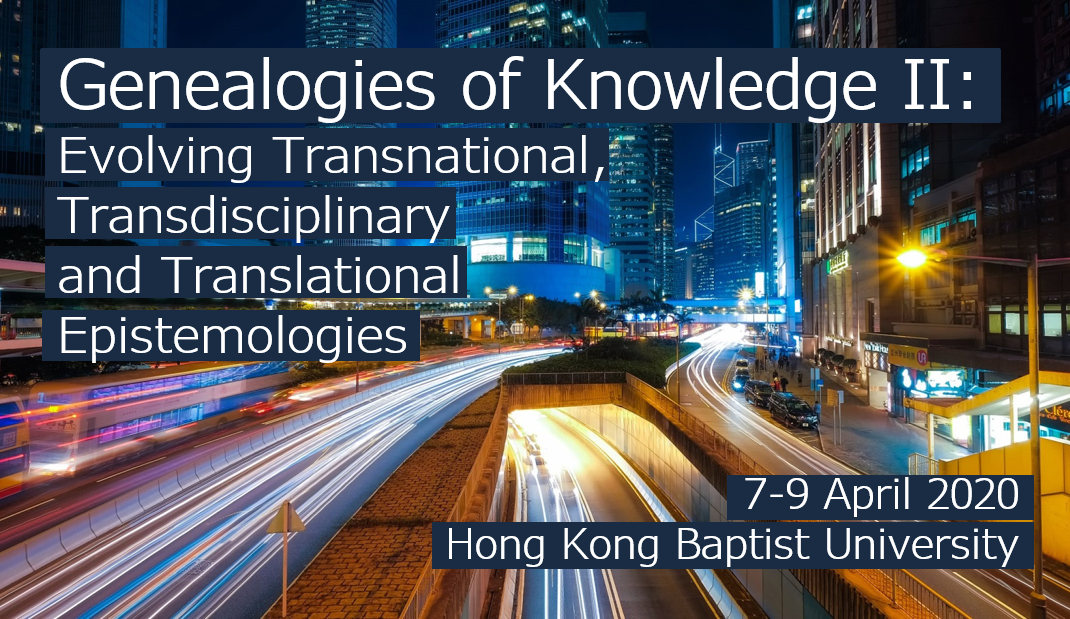An international conference hosted by the
Centre for Translation and the Department of Translation, Interpreting and Intercultural Studies,
Hong Kong Baptist University, Hong Kong
In collaboration with the
Genealogies of Knowledge Project, University of Manchester, UK
7-9 April 2020
CONFERENCE THEME KEYNOTE SPEAKERS
VENUE IMPORTANT DATES OPEN PANELS ABSTRACTS PRESENTERS
Keynote speakers
| Daryn Lehoux |
|---|

Transmission, Translation, and Trans-temporality in the Epistemology of Science: A Test Case in the History — and Historiography — of Ancient Greek Astrology
Abstract: Even to talk about astrology as relevant to the epistemology of the sciences is to cross a surprising number of boundaries. Astrology is of course no longer seen as a scientific discipline, but in other times and places, it certainly was. The epistemology of ancient astrology was also in itself an inherently transdisciplinary undertaking, combining ancient astronomy, physics, psychology, and physiology into sometimes very complex and compelling arguments both for and against. At the same time, the Greeks and Romans also put special emphasis on the transnational origins of astrology, with exoticism itself carrying epistemic weight from afar. Astrology was well known to Greeks and Romans as having originated (or even having been perfected) in Babylon and Egypt, often with a wildly exaggerated lineage of many millennia. The supposed hoary age of classical astrology raises other issues: the transmission (both real and imagined) of astronomical knowledge across time has important epistemic consequences, both for the scale of its relevant data base about human fates, and for the accuracy of its mathematical predictions about planetary positions. And time rears its head on another front. The modern historiographic practice of reaching back in time to take ancient astrology seriously as a body of knowledge raises questions about how we understand what it means to talk about knowledge of the natural world in the first place. Daryn Lehoux is Professor of Classics and Professor of Philosophy at Queen’s University, Canada. He is the author of Creatures Born of Mud and Slime: The Wonder and Complexity of Spontaneous Generation (Johns Hopkins, 2017), What Did the Romans Know? An Inquiry into Science and Worldmaking (Chicago, 2012), and Astronomy, Weather, and Calendars in the Ancient World (Cambridge, 2007), as well as the co-editor of Lucretius: Poetry, Philosophy, Science (Oxford, 2013). He has published extensively on the history and philosophy of science and works at the intersections of epistemology and historiography. |
| Tony McEnery |
|---|

The Road to Brexit: A Discourse Historical Analysis of 5 Decades of News Reporting on Europe in the Times Newspaper
Abstract: When the UK voted to exit the European Union in 2016, many tried to understand the event. Opinion polls, the analysis of voting patterns, studies of the press in the run up the vote, the role of social media and machine learning all came to prominence as people and organizations tried to understand what was an unexpected outcome for many. In the research presented in this keynote session, undertaken with Helen Baker and Vaclav Brezina, we approached this question with a different mindset. Much of the work we have done in the past has been focused on exploring the development of attitudes and ideas, as reflected in language, over long stretches of time. We believe that in taking this approach we can start to understand long term trends that give rise to specific, notable, events. Brexit was not the result of one or two months of campaigning. Brexit needs to be understood in the long term. Only by doing so can we begin to answer questions such as: ‘How did the UK vote for Brexit when no major political party in the UK has ever campaigned to leave the EU?’, ‘How and why did attitudes to the EU change in the UK between it voting to stay in the EU in the 1975 and voting to leave in 2016?’, and ‘What were the key events over time that led to Brexit?’ In this session, I approach questions such as these in two ways. After reviewing the history of British engagement with what is now the EU, I will summarize what, according to researchers in academic disciplines such as history and politics, have been the major arguments for and against staying in the EU over time. This will be followed up by a study of a corpus of over three billion words published in machine readable form by The Times from the 1960s to the present. Using techniques pioneered by linguists to look at and start to comprehend data on this scale with the help of computers, I explore the totality of this corpus to look at how attitudes to the EU shifted over time and link those to historical events. By doing this it is possible to show, for the first time, on a very large scale how British attitudes to the EU developed over time, as viewed through the prism of The Times, and to reflect on the claims made by the smaller scale, qualitative research, undertaken by historians and political science researchers while gaining a deeper understanding of the drivers of Brexit. Tony McEnery is the Founding Director of the Economic and Social Research Council (ESRC) Centre for Corpus Approaches to Social Science (CASS). He is also Distinguished Professor of English Language and Linguistics at Lancaster University, UK. He was the founding Director of Research at the UK Arts and Humanities Research Council (2005-2008) and later was Director of Research (2016-2018) and interim Chief Executive (2017-2018) of the UK Economic and Social Research Council. He was Dean of the Faculty of Arts and Social Sciences (2008-2012) and Head of Department of the Department of Linguistics and English Language (2000-2005) at Lancaster University. He has authored a large number of books on the use of large bodies of language data, so called corpora, to study language and has used them to explore a range of languages. His published works include Corpus Linguistics: Theory Method and Practice (CUP, 2011), Discourse Analysis and Media Attitudes: The Representation of Islam in the UK Press (CUP, 2013) and Aspect in Chinese (with Richard Xiao, John Benjamins, 2004). |
| Tejaswini Niranjana |
|---|

Translation: When Act Becomes Metaphor
Abstract: The theorizing of translation and the colonial context in the 1990s, initiated in part by my book Siting Translation, opened up new questions about language and power, inequality and representation. Several critiques are now available of both humanistic and ethnographic ideas of translation, which were based on grasping literary value or cultural value through a universalist lens. Such critiques helped open up the realm of linguistic translation to questions of the political, drawing attention to the asymmetries structuring all acts of translation. While this moment of critique was enormously productive, it also helped take the concept of translation into a number of different fields, from architecture to bio-medical research, where the literal meaning of the term gave way to diverse kinds of metaphoric uses. In my talk, I plan to explore what happens during the metaphoric transition, whether the act of translation and its linguistic register disappear altogether or whether they constitute an occluded lens through which the metaphors continue to be viewed. I will draw on examples from my own work over the years, including my interest in the Caribbean, in music, and in the making of the ‘social subject’. Tejaswini Niranjana is currently Professor and Head, Department of Cultural Studies, Lingnan University, Hong Kong. She is also Visiting Professor with the School of Arts and Science at Ahmedabad University, India. She is co-founder of the Centre for the Study of Culture and Society, Bangalore, which offered an innovative inter-disciplinary PhD programme from 2000-2012. During 2012-16, she headed the Centre for Indian Languages in Higher Education at the Tata Institute of Social Sciences, Mumbai, and was Indian-language advisor to Wikipedia. She is the author of Siting Translation: History, Post-structuralism and the Colonial Context (Berkeley, 1992), Mobilizing India: Women, Music and Migration between India and Trinidad (Durham, 2006), and Musicophilia in Mumbai (forthcoming in 2019). Among her edited volumes is Genealogies of the Asian Present: Situating Inter-Asia Cultural Studies (Delhi, 2015), with Wang Xiaoming. |
| Seteney Shami |
|---|

Transdisciplinary Knowledge Circulations and Knowledge Connections: Academia, Activism and Critique in the Arab Region
Abstract: The ongoing social and protest movements in the Arab region are powerfully interrogating prevailing concepts of state, citizenship, belonging and political participation. Regardless of the strong backlash, outbreak of civil and regional warfare, renewed authoritarianism and increased securitization of all aspects of life, the region continues to throw up new forms of resistance, civic activism and public engagement that are mobilizing around alternative concepts of social justice and visions of the future. Among other issues, these dynamics challenge existing eco-systems of knowledge production and put to question the kinds of knowledge being produced as well as the circulation and dissemination of such knowledge. What possibilities are emerging from new actors and thought-communities, such as youth movements, new media outlets and issue-driven activism? And where does academic knowledge sit in the midst of these other forms of knowledge production and circulation? The Arab region is at a particularly acute juncture for posing these questions, which however are global in nature. The challenges posed to academic knowledge production include those levelled at disciplines, academic departments and university-society relations. There is an urgent search for transdisciplinary, cross-sectoral and trans-regional initiatives and collaborations, all of which require new infrastructures for the production and circulation of knowledge. What are the means and possibilities for the production of Arab academic knowledge for these new times? What are the ways in which boundaries are drawn and redrawn, processes of inclusion and exclusion are practiced and knowledge is classified and typologized and differentially valued within academia and beyond academia? What types of knowledge connections will provide the narratives and practices for the generation in-the-making across the region and the globe? Seteney Shami is an anthropologist and serves as Founding Director of the Arab Council for the Social Sciences (ACSS), a regional non-profit organization based in Beirut, as well as Program Director for the Middle East North Africa and InterAsia programs at the Social Science Research Council (SSRC). Her fieldwork has focused on Jordan, Egypt, Turkey and the North Caucasus, and her research interests include ethnicity and nationalism in the context of globalization, urban politics and state‐building strategies, and population displacement and transnational mobility. She recently co-edited Middle East Studies for the New Millennium: Infrastructures of Knowledge (with C. Miller-Idriss, SSRC and NYU Press, 2016), and co-authored Seeing the World: How U.S. Universities make Knowledge in a Global Era (with M. Stevens and C. Miller-Idriss, Princeton University Press, 2018). She has taught at Yarmouk University, UC Berkeley, University of Chicago and Stockholm University and has been a Visiting Professor at Georgetown University and Swedish Collegium for Advanced Studies. She has served on the editorial boards of Central Asian Survey, The Encyclopedia of Women and Islamic Cultures, Cultural Anthropology, Maghreb-Machrek and others. |
 |
 |
 |
 |


